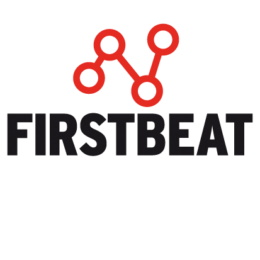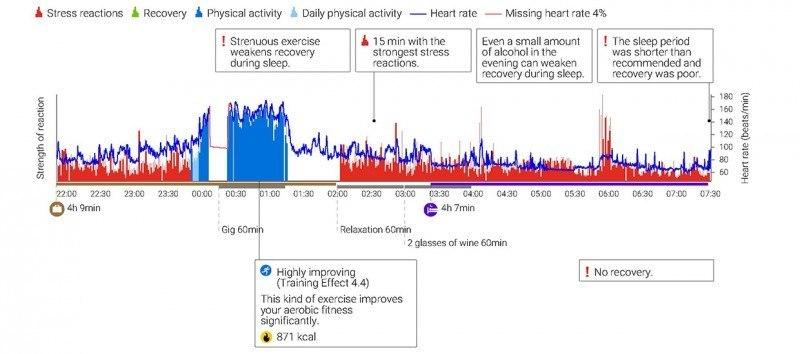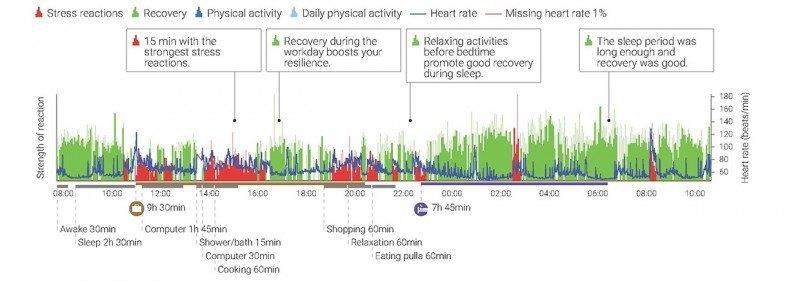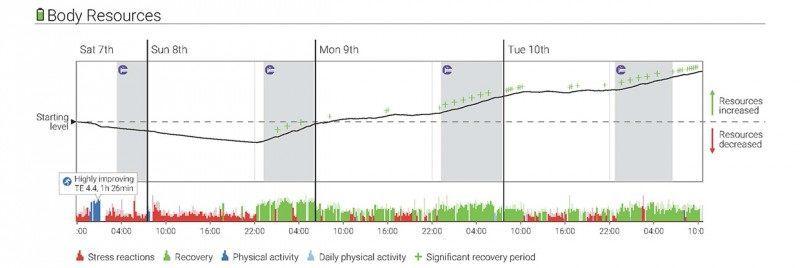
Introduction
Lauri Tähkä is a Finnish musician and pop icon with nearly two decades of experience in the frequently hectic music industry. Over the years, he developed a personal interest in stress and recovery issues, specifically how they influence his stage performances and health.

Tähkä recently brought Firstbeat Lifestyle Assessment on the road and under the lights to quantify the impact of travel and performance on his body. He also hoped to gain insight for achieving a good balance and maximizing recovery opportunities when available.
Firstbeat Lifestyle Assessment
The Firstbeat Lifestyle Assessment uses heart rate variability (HRV) analysis to make stress and recovery visible. During the assessment, Firstbeat’s professional grade Bodyguard 2 HRV monitoring device captures a 72-hr continuous sample of the participants heart rate variability sampled at 1000 times per second. This heartbeat data is combined with entries from a digital mobile journal the participant uses during the assessment to link monitoring results to daily activities and decisions.
In order to fully reflect the participant’s lifestyle, Firstbeat uses a round-the-clock monitoring approach to ensure the assessment offers a complete picture of personal well-being. While a typical assessment period lasts 72 hour (2-work days, 1-day off), the diversity of Tähkä’s activity suggested a longer 96 hour monitoring period would better reveal the impact of his lifestyle. During this time, his activities included hundreds of kilometers of driving, a pair of performances, a restless night in a hotel between shows, a Father’s day celebration, a birthday party, a short illness and some down time at home.
Performance
Tähkä describes performing for an audience as “an intense workout… I get so much strength from the audience and the interaction is amazing.” Not surprisingly, his energetic performance burned nearly a 1000 calories and doubled as an excellent physical workout.
Firstbeat Wellness Coach Siiri Naukkarinen described his performance effort, “his heart rate and Training Effect were similar to someone who had been running hard for an hour”. Training Effect is one of Firstbeat’s most successful proprietary analytic tools that describes the impact activity has on total fitness levels.
It was also revealed that hard exercise on the day of a show could be counter-productive as it was more likely to weaken his evening performance than contribute to improved overall fitness.
Recovery
Tähkä would rather return home between performances than stay overnight in a hotel. His Lifestyle Assessment confirmed that his preference has a strong basis in how his body naturally recovers. Naukkarinen explains, “not only was Tähkä’s sleep during his hotel stay too short, but his sleep was inefficient and didn’t allow his body to recover from his performance.” His body did not begin to recover efficiently until he returned home the day after his last performance.
His assessment also revealed a value of taking breaks and mindful activity, validating Tähkä’s personal philosophies on the subject. “I think sometimes you just have to take an hour of me-time and focus on enjoying some pulla,” Tähkä explains. Pulla is a Finnish pastry spiced with cardamom and a familiar feature of Finland’s famous coffee breaks. “You have to be merciful on yourself and allow yourself to enjoy, as well.”
During his assessment he marked these “me-time moments” in his digital journal and received confirmation that they stimulated good recovery were a critical component of his well-being.
Management
While it is impossible to eliminate the need for travel and chaos of being a performance artist, awareness opens the possibility of preparedness. Tähkä views healthy nutritional habits and getting enough sleep and exercise as part of an artist’s job. Knowing the special demands of this work means taking preventative work seriously
“Sometimes I feel exhausted, “ Tähkä explains. “I am not a young guy anymore and my work is demanding. I drive a lot and often sleep poorly.” His experience over the years has taught him that staying in shape is one way to minimize the physical toll of his work.
Another factor is active engagement with relaxation and a willingness to focus on good recovery. “Listening to your body is crucial. I’ve always reserved some time for recovering after a show. I have to get my batteries recharged,” he continues. This observation has practical implications in terms of scheduling. Similar to a top athlete preparing for a season, he has learned to build performance peaks and recovery into his performance schedules.
Naukkarinen uses his Lifestyle Assessment report to show how his work has paid off. “His body is remarkably resilient and that allows him to handle the sometimes chaotic demands of his work,” she explains. But that doesn’t mean there isn’t room for improvement. She also uses the report to illustrate that he could benefit from some calming down time before actually going to bed. “That would enhance his recovery even more,” she concludes.
In Lauri’s own words:
“It is important to check your coping every now and then and to get facts to support your own experiences. It was nice to see my everyday life reported. I had the feeling that my shows are very physical and the Lifestyle Assessment report proved it. I was surprised how good my recovery was. Ultimately, I’m very satisfied with the results of my assessment, I am glad to see that both my mind and body can handle this hard work.”
If you liked this article, you should subscribe to our mailing list
You might also be interested in

Boosting Pilot Well-Being with Personal B.A.S.E. and Firstbeat Life
In the high-stakes world of air rescue, maintaining peak physical and mental performance is critical. Gerhard Moser has developed a unique approach to helping his clients achieve optimal health and…
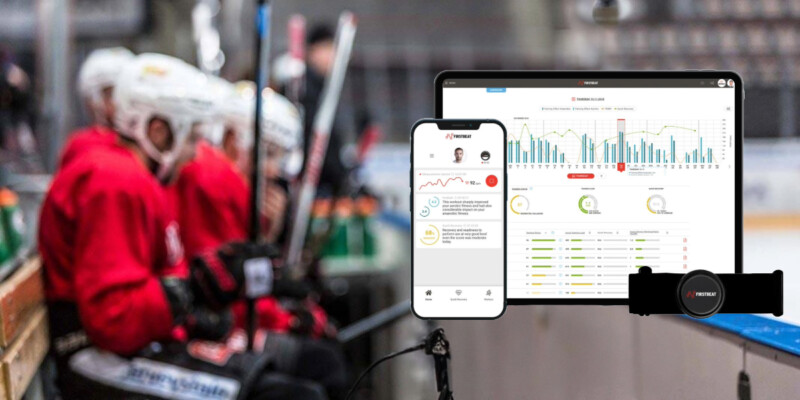
Why Nearly 50% of NHL Teams Rely on Firstbeat for Results
Since 2008, Firstbeat Technologies has played a part behind the scenes at many of the North American league’s 31 franchises.
